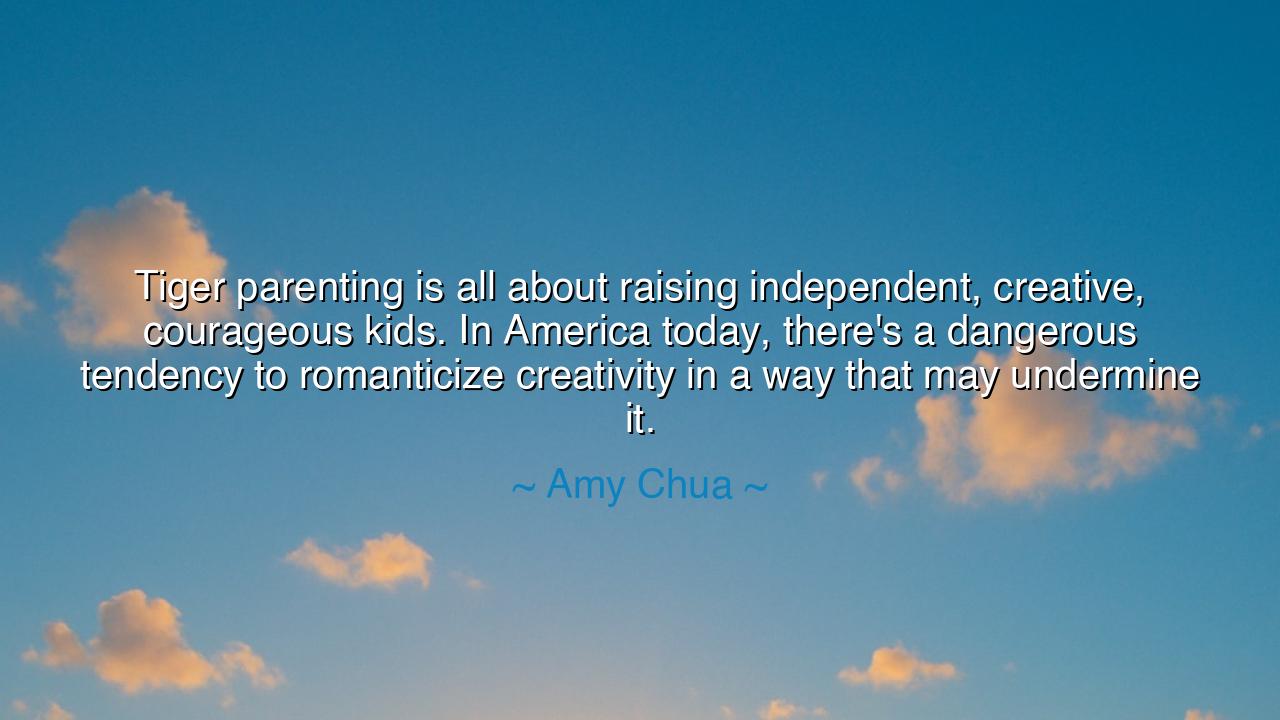
Tiger parenting is all about raising independent, creative
Tiger parenting is all about raising independent, creative, courageous kids. In America today, there's a dangerous tendency to romanticize creativity in a way that may undermine it.






Hear the words of Amy Chua, fierce and unflinching: “Tiger parenting is all about raising independent, creative, courageous kids. In America today, there’s a dangerous tendency to romanticize creativity in a way that may undermine it.” In this declaration, she names the tension between discipline and freedom, between the fire that forges character and the indulgence that weakens it. For in her vision, tiger parenting is not the destruction of joy, but the cultivation of strength; not the suppression of creativity, but the building of the structure in which creativity can truly flourish.
From the ancients we know this to be true: discipline and creativity are not enemies, but companions. The sculptor must first learn the hardness of stone before shaping beauty. The poet must first master rhythm and meter before breaking free into song. The warrior must first endure the drills of the field before facing the chaos of battle with courage. In the same way, children must be given not only freedom, but the training of mind and spirit that equips them to stand independent, to face hardship, to create not from laziness but from mastery.
Chua warns us of the “romanticizing of creativity” in America—a vision that tells parents and children alike that to be creative is simply to be free, to cast aside boundaries, to let inspiration flow without effort. But history shows the folly of this. Michelangelo did not paint the Sistine Chapel by waiting for inspiration; he labored for years, bent on scaffolding, guided by training, discipline, and unrelenting practice. Beethoven, though deaf, composed symphonies not because creativity came easily, but because years of rigor had given him tools that endured even when his body failed. True creativity is born not of indulgence, but of perseverance.
Consider, too, the story of the samurai. They were artists of both sword and spirit, trained in strict codes of discipline. Yet within this rigor bloomed poetry, calligraphy, and philosophy. Their courage and creativity did not wither under discipline—it was sharpened by it. So too does Chua remind us: when parenting is firm, when expectations are high, when courage is demanded, children are not crushed—they are refined, and their creativity becomes deeper, more resilient, more enduring.
And yet, Chua does not dismiss the value of freedom altogether. Her warning is not against creativity itself, but against its romanticization—the belief that it can thrive without structure, that independence can grow without guidance. A child left untended may confuse indulgence with freedom and chaos with creativity. The wise parent must find the middle path: discipline to provide the foundation, and freedom to let the child build upon it. This is the essence of tiger parenting—not cruelty, but courage; not rigidity, but resilience.
The lesson, then, is clear: do not confuse indulgence with nurture, nor weakness with compassion. If you wish your children to be independent, do not shield them from difficulty. If you wish them to be creative, do not deprive them of discipline. If you wish them to be courageous, do not spare them from challenge. Love is not the absence of demands—it is the gift of high expectations, paired with guidance and faith in their ability to rise.
Therefore, let every parent who hears these words take action: teach your children the value of work, the power of persistence, and the strength of discipline. Celebrate creativity, but also demand rigor. Encourage dreams, but also train resilience. In doing so, you will not diminish their light, but give it the lamp of endurance in which it may shine for a lifetime.
Thus Amy Chua’s words, often misunderstood, echo the wisdom of the ancients: independence, creativity, and courage are not born of indulgence, but of discipline joined with love. And if we honor this truth, we will raise not fragile children of momentary brilliance, but strong souls whose creativity endures through the trials of life.






AAdministratorAdministrator
Welcome, honored guests. Please leave a comment, we will respond soon